Until I read Philbrick’s Valiant Ambition, I hadn’t realized how much dissent there was among American generals during the Revolutionary War. The fact that they managed to cooperate long enough to defeat the British is astonishing. But in an odd way, their disagreements give me hope (as do the rifts between the Founding Fathers). There’s hope for us yet, if these far-from-perfect men could accomplish so much.
And on the subject of far-from-perfect men: let’s talk about Charles Lee (1731-1782). When the Revolutionary War broke out, Lee had much more military experience than George Washington. Born in Chester, England, to a British officer, Lee joined the army at age 14. He served in the French and Indian Wars, then in Portugal. While Great Britain was at peace (it did happen, once in a while), Lee hired himself out to the king of Poland, where he rose to the rank of major general; at home, he never rose higher than lieutenant colonel.
Lee vociferously opposed King George III’s treatment of the colonies. In 1773 he moved to America and bought property in Virginia (now West Virginia). He also traveled throughout the colonies, meeting George Washington, Patrick Henry, and John Adams, among others.
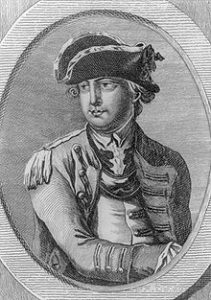
Despite Lee’s military experience, in 1775 it was George Washington whom the Continental Congress named commander in chief. But Washington was only in charge of part of the army. General Lee was sent to command the southern army, in South Carolina. His success in defending Fort Moultrie (near Charleston) on June 18, 1776, made him a hero – particularly after Washington’s disastrous defeat at the Battle of Long Island in August 1776. Soon Lee, Horatio Gates, and other American generals were jockeying to replace Washington as commander in chief.
And then there came the fall of Fort Washington, the last patriot stronghold in Manhattan. Against General Washington’s better judgment, he allowed General Greene to persuade him to try to hold it. The British captured it in a matter of hours on November 16, 1776, along with more than 2,800 American soldiers and provisions that the Continental Army desperately needed. Across the Hudson, Fort Lee (named for none other than Charles Lee) was abandoned four days later.
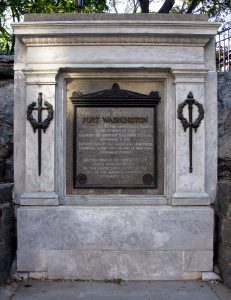
Lee on Washington
Soon after the loss of Forts Washington and Lee, Washington opened a letter to his trusted aide Joseph Reed. He assumed it was official business. Instead, he found a letter from Charles Lee, dated November 30, 1776, replying to a letter by Reed:
I receiv’d your most obliging flattering letter—lament with you that fatal indecision of mind which in war is a much greater disqualification than stupidity or even want of personal courage—accident may put a decisive Blunderer in the right—but eternal defeat and miscarriage must attend the man of the best parts if curs’d with indecision. The General recommends in so pressing a manner as almost to amount to an order to bring over the Continental Troops under my command—which recommendation or order throws me into the greatest dilemma from sev’ral considerations … I only wait myself for this busyness I mention of Rogers & Co being over—shall then fly to you—for to confess a truth I really think our Chief will do better with me than without me. … (Whole letter here, note 1)
It’s a telling indication of the chain of command in the American army that General Washington can only recommend that Lee join him!
Two weeks later, Lee was still meandering his way to meet Washington. On December 13, 1776, he spent the night three miles from Washington’s encampment, at a comfortable inn at Basking Ridge. From there he wrote to his friend General Horatio Gates:
The ingenious manoeuvre of Fort Washington has completely unhinged the goodly fabrick we had been building. There never was so damned a stroke; entre nous, a certain great man is most damnably deficient. He has thrown me into a situation where I have my choice of difficulties. If I stay in this Province, I risk myself and Army; and if I do not stay, the Province is lost forever. I have neither guards, cavalry, medicines, money, shoes, or stockings. I must act with the greatest circumspection. Tories are in my front, rear, and on my flanks. The mass of the people is strangely contaminated. In short, unless something which I do not expect turns up, we are lost. Our counsels have been weak to the last degree. As to what relates to yourself, if you think you can be in time to aid the General, I would have you, by all means, go. You will, at least, save your Army. It is said that the Whigs are determined to set fire to Philadelphia. If they strike this decisive stroke, the day will be our own; but unless it is done, all chance of liberty, in any part of the globe, is forever vanished. (Whole letter here)
What do you suppose would have happened to the morale of Lee’s troops if their commander spoke like this in front of them? There’s a difference between acknowledging a difficult situation and predicting immediate and eternal catastrophe if the current effort fails.
Washington wrote to Lee the following day (12/14/1776):
I last night received your Letter of the 11th Instt by Major Dehart. I am much surprized that you should be in any doubt respecting the Route you should take after the information you have had upon that Head as well by Letter as from Majr Hoops who was dispatched for the purpose. … I have so frequently mentioned our situation, and the necessity of your aid, that it is painfull to me to add a word upon the Subject. Let me once more request and entreat you to march immediately for Pitts Town …
The Congress have adjourned from Philadelphia, to meet at Baltimore on the 20th Inst. & sensible of the importance of the former have directed it to be defended to the utmost extremity to prevent the Enemy from possessing it. the fatal consequences that must attend it’s loss are but too obvious to every one. Your arrival may be the means of saving it, Nothing but a respectable force, I am certain from melancholy experience can induce the Militia to come in and give their Aid. (Whole letter here)
Washington, too, knows that to lose Philadelphia would be a devastating blow to the United States, and he’s practically begging Lee to bring his troops to help defend it.
Lee as prisoner of war
But Lee could not help defend Philadelphia, because a British patrol captured him at the tavern in Basking Ridge, as he was writing letters in his nightgown. He spent the next 16 months imprisoned in New York.
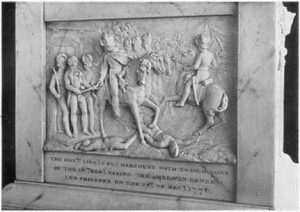
Three months into his captivity, Major General Charles Lee wrote out for General William Howe a plan for how the British could win the war. It begins:
As on the one hand it appears to me that by the continuance of the War America has no chance of obtaining the ends She proposes to herself; that altho by struggling She may put the Mother Country to very serious expence both in blood and Money, yet She must in the end, after great desolation havock and slaughter be reduc’d to submit to terms much harder than might probably be granted at present – and as on the other hand Great Britain tho’ ultimately victorious, must suffer very heavily even in the process of her victories, every life lost and every guinea spent being in fact worse than thrown away … and as I am not only perswaded from the high opinion I have of the humanity and good sense of Lord and General Howe that the terms of accommodation will be as moderate as their powers will admit …
He goes on to list specific places the British should attack in order to defeat the rebellious colonists.
To bring matters to a conclusion, it is necessary to unhinge or dissolve, if I may so express myself, the whole system or machine of resistance, or in other terms, Congress Government – this system or machine, as affairs now stand, depends entirely on the circumstances and disposition of the People of Maryland Virginia and Pensylvania – if the Province of Maryland or the greater part of it is reduc’d or submits and the People of Virginia are prevented or intimidated from marching aid to the Pensylvania Army the whole machine is dissolv’d and a period put to the War, to accomplish which, is, the object of the scheme which I now take the liberty of offering to the consideration of his Lordship and the General, and if it is adopted in full I am so confident of the success that I wou’d stake my life on the issue …
I would propose that four thousand men [British soldiers] be immediately embark’d in transports, one half of which shou’d proceed up the Patomac and take post at Alexandria, the other half up Chesepeak Bay and possess themselves of Annapolis. They will most probably meet with no opposition in taking possession of these Posts, and when possess’d they are so very strong by nature that a few hours work and some trifling artillery will secure them against the attacks of a much greater force than can possibly be brought down against them …
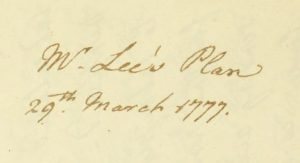
This breathtakingly treasonous document, written throughout in Lee’s own hand, was only discovered and published in 1860 (whole document and background here; quotes are from pp. 84-88).
The American Crisis
On December 23, 1776, in the aftermath of the Battle of Long Island and the loss of Forts Washington and Lee, Thomas Paine (now a volunteer in the Continental Army) published the first essay in his series “The American Crisis.”
These are the times that try men’s souls. The summer soldier and the sunshine patriot will, in this crisis, shrink from the service of their country; but he that stands it now, deserves the love and thanks of man and woman. Tyranny, like hell, is not easily conquered; yet we have this consolation with us, that the harder the conflict, the more glorious the triumph. What we obtain too cheap, we esteem too lightly: it is dearness only that gives every thing its value. … (Yes, you should read the rest: here.)
Washington had the opening of this essay read to his troops three days later, on December 26, 1776, as they prepared to cross the Delaware to attack the Hessian soldiers at Trenton.
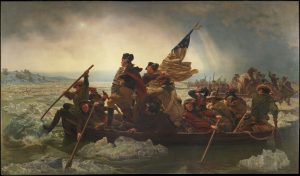
Washington at Valley Forge
While General Lee was languishing in New York from mid-December 1776 through early 1778, Washington and his army fought at Trenton, Princeton, Brandywine, and Germantown, lost Philadelphia to the British in September 1777, and settled down to wait out the winter 20 miles from Philadelphia, at a place called Valley Forge. From there, on December 23, 1777, Washington wrote to Henry Laurens, president of the Continental Congress:
Sir: Full as I was in my representation of matters in the Commys. departmt. yesterday, fresh, and more powerful reasons oblige me to add, that I am now convinced, beyond a doubt that unless some great and capital change suddenly takes place in that line, this Army must inevitably be reduced to one or other of these three things. Starve, dissolve, or disperse, in order to obtain subsistence in the best manner they can; rest assured Sir this is not an exaggerated picture, but [and] that I have abundant reason to support what I say.
Yesterday afternoon receiving information that the Enemy, in force, had left the City, and were advancing towards Derby with apparent design to forage, and draw Subsistance from that part of the Country, I order’d the Troops to be in readiness, that I might give every opposition in my power; when, behold! to my great mortification, I was not only informed, but convinced, that the Men were unable to stir on Acct. of Provision, and that a dangerous Mutiny begun the Night before, and [which] with difficulty was suppressed by the spirited exertion’s of some officers was still much to be apprehended on acct. of their [for] want of this Article. …
I can assure those Gentlemen that it is a much easier and less distressing thing to draw remonstrances in a comfortable room by a good fire side than to occupy a cold bleak hill and sleep under frost and Snow without Cloaths or Blankets; however, although they seem to have little feeling for the naked, and distressed Soldier, I feel superabundantly for them, and from my Soul pity those miseries, wch. it is neither in my power to relieve or prevent. (Whole letter here)
The Continental Congress, which had decamped to Lancaster and then York, Pennsylvania, had its own challenges. Henry Laurens wrote to his son John (one of Washington’s aides, and a good friend of Alexander Hamilton) in January 1778: “Our whole frame is shattered. We are tottering and without the immediate exertions of wisdom and fortitude we must fall flat down.” (Whole text here, pp. 267-9)
Lee returns to the American army
After Charles Lee was released on a prisoner exchange in the spring of 1778, he was reinstated as second-ranking general in the Continental Army. (Of course, no one on the American side knew of that treasonous document written for General Howe.) In June, as the British prepared to evacuate Philadelphia, Lee was one of the senior advisers in the council of war that Washington held to discuss whether the American army should attack the British as they marched overland to New York.
Drumroll.
Next week: the Battle of Monmouth.
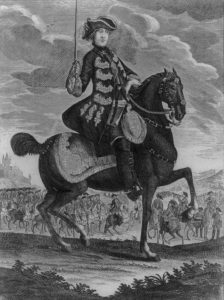
More
- During the French and Indian War, Lee married the daughter of a Seneca chief. Among the Senecas, his name was Ounewaterika, “Boiling Water.”
- More on Thomas Paine in the Hamilton Musical series: this post on Common Sense, and this one on the lead-up to the Revolution.
- Highly recommended: Nathaniel Philbrick, Valiant Ambition: George Washington, Benedict Arnold, and the Fate of the American Revolution, which tells the Revolutionary War from a very different perspective. It’s not the first book you should read on the subject, but it’s a great spur to integration if you’ve read about many of the featured players.
- I’ve occasionally added comments based on these blog posts to the Genius.com pages on the Hamilton Musical. Follow me @DianneDurante.
- The usual disclaimer: This is the twenty-second in a series of posts on Hamilton: An American Musical. Other posts are available via the tag cloud at lower right. The ongoing “index” to these posts is my Kindle book, Alexander Hamilton: A Brief Biography. Bottom line: these are unofficial musings, and you do not need them to enjoy the musical or the soundtrack.
- Want wonderful art delivered weekly to your inbox? Check out my free Sunday Recommendations list and rewards for recurring support: details here.
